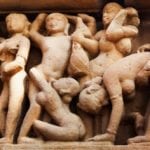 History
History  History
History  Animals
Animals 10 New Shark Secrets That Recently Dropped
 Movies and TV
Movies and TV 10 Forgotten Realities of Early Live Television Broadcasts
 Technology
Technology 10 Stopgap Technologies That Became Industry Standards
 Weird Stuff
Weird Stuff 10 Wild Facts About Taxidermy That You Probably Didn’t Know
 Travel
Travel 10 Beautiful Travel Destinations (That Will Kill You)
 Miscellaneous
Miscellaneous 10 Modern Marriage Rituals Born from Corporate Branding
 Weird Stuff
Weird Stuff Ten Bizarre Visions of 2026 from Fiction
 Weird Stuff
Weird Stuff The 10 Unluckiest Days from Around the World
 Food
Food 10 Modern Delicacies That Started as Poverty Rations
 History
History Top 10 Historical Disasters Caused by Someone Calling in Sick
 Animals
Animals 10 New Shark Secrets That Recently Dropped
 Movies and TV
Movies and TV 10 Forgotten Realities of Early Live Television Broadcasts
Who's Behind Listverse?

Jamie Frater
Head Editor
Jamie founded Listverse due to an insatiable desire to share fascinating, obscure, and bizarre facts. He has been a guest speaker on numerous national radio and television stations and is a five time published author.
More About Us Technology
Technology 10 Stopgap Technologies That Became Industry Standards
 Weird Stuff
Weird Stuff 10 Wild Facts About Taxidermy That You Probably Didn’t Know
 Travel
Travel 10 Beautiful Travel Destinations (That Will Kill You)
 Miscellaneous
Miscellaneous 10 Modern Marriage Rituals Born from Corporate Branding
 Weird Stuff
Weird Stuff Ten Bizarre Visions of 2026 from Fiction
 Weird Stuff
Weird Stuff The 10 Unluckiest Days from Around the World
 Food
Food 10 Modern Delicacies That Started as Poverty Rations
Top 10 Watershed Moments In History
A critical turning point (a watershed moment) in history is when something changes and things will never be the same again. This list looks through history at the most significant events that truly did change the world. Whether those changes are for the better or worse is obvious in most cases, but not always – especially as one can never compare the future if the watershed moment didn’t occur. Enjoy the list and add your own significant historical events to the comments.
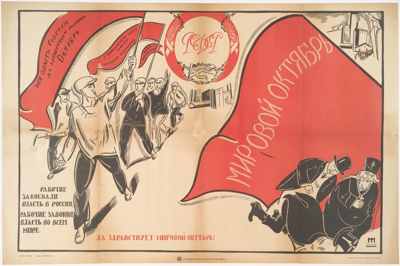
The second phase of the Russian Revolution, the October Revolution, had overthrown the Russian Provisional Government (established after deposition of the Tsar) and gave power to the Bolsheviks. The policies of the Russian Provisional Government had brought the country to the brink of catastrophe, and the country faced the threat of financial bankruptcy. An armed insurrection in Petrograd (St. Petersburg) on 25 October, 1917, with Bolshevik operatives sent out from the Smolny by Vladimir Lenin. They took over all critical centers of power in Petrograd in the early hours of the night, without a shot being fired. The success of the October Revolution transformed the Russian state from parliamentarian to socialist in character, and led to the eventual formation of the Soviet Union. The revolution played an important part in defining the whole of the 20th century. Subsequent large-scale industrialization under the communist regime, and its role in World War II, saw the USSR emerge as a global superpower. It extended its influence into much of Eastern Europe and beyond, thereby leading to the cold war, and clashes, often violent, between communist and capitalist ideologies all over the world.
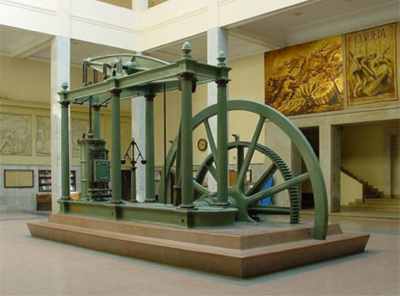
Although there had been other kinds of engines around, James Watt added a separate condenser, thereby reducing by almost 75% the fuel that had been used by previous engines. Watt’s addition to the steam engine caused its production and overall usefulness to skyrocket in the 1800s, and the development of a practical, efficient steam engine and its application to industry and transportation caused a great leap for industrialization. Its application was virtually limitless; it was used on railways, paddle steamers and steamboats and was not only used to move goods from place to place, but also to move people. The development and subsequent application of steam power was undoubtedly the greatest technical achievement of the Industrial Revolution, and was responsible for lifting industries from infancy to adolescence.
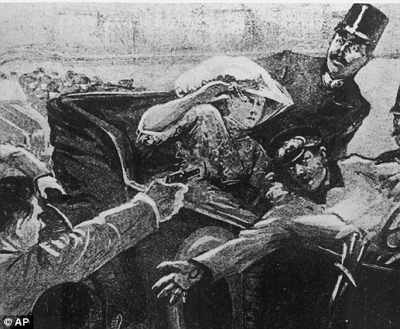
The murder of the heir to the Austro-Hungarian Empire, and his wife, by the Pan-Slavist military society, Black Hand, produced widespread shock across Europe. An ultimatum, known as the July Ultimatum, was issued by Austria-Hungary which was partially accepted, finessed, disingenuously answered or politely rejected by Serbia. Austria-Hungary then declared war on Serbia, thereby obliging Russia and France to mobilize their armies under the clauses of the “Secret Treaty of 1892”. Russia’s mobilization set-off full Austro-Hungarian and German mobilizations, and paved the way for the great war. This first case of total war completely redefined the nature of European politics, and allowed for the emergence of the US as a superpower.
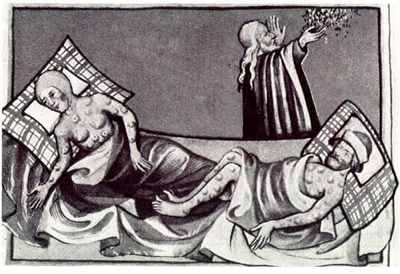
One of the deadliest pandemics in human history, the Black Death is credited for devastating the medieval population and causing a substantial change in economy and society in all areas of the world. The initial outbreak of plague, in the Chinese province of Hubei in 1334, claimed up to ninety percent of the population, and succeeding outbreaks caused the death of two-thirds of China’s population. In Europe, it is estimated that between one-quarter and two-thirds of the European population died from the outbreak between 1348 and 1350. The sudden shortage of cheap labor provided an incentive for landlords to compete for peasants with wages and freedoms, thus sowing the seeds for capitalism. The resulting upheaval also paved the way for the “Renaissance”. It took almost 150 years for Europe’s population to recover from this devastating plague.
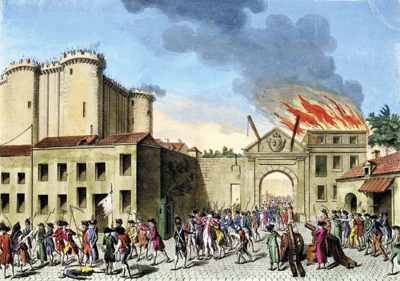
The medieval fortress and prison in Paris, known as the Bastille, represented royal authority in the center of Paris. Its storming, on 14th July, 1789, was a flashpoint of the French Revolution, and the Bastille eventually became an icon of the French Republic. To the people of Paris, the Bastille was a symbol of brutality and totalitarian power, and, although the prison only held seven prisoners, the storming of the Bastille had done far more than release these seven men: It brought an ancient system of royal tyranny to an end. Upon learning that the Bastille had been taken, King Louis XVI asked an aid, “Is this a revolt?” The answer came swiftly: “No, sire. It is a revolution.” The storming led to the subsequent publication of the “Declaration of the Rights of Man and Citizen”, and an epic march on Versailles. It was not long before Louis XVI was executed, and the modern era unfolded in the shadow of the French Revolution- growth of republics and liberal democracies, the spread of secularism, and most importantly, the rise and fall of Napoleon completely defined the politics of modern Europe.
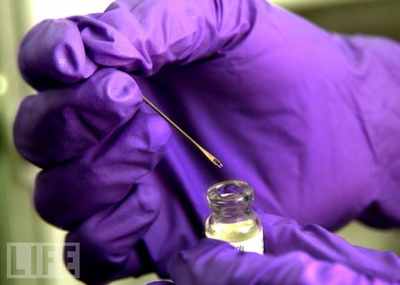
Smallpox has been, without a shadow of a doubt, the deadliest disease in the history of human kind. Smallpox was greatly feared, as one in three of those who contracted the disease died, and those who survived were often badly disfigured. During the 18th century, small pox killed an estimated 400,000 Europeans per year, and was responsible for an estimated 300–500 million deaths during the 20th century. With the arrival of European Settlers in the New World, the outbreak of small pox wiped out 80-90% of the Native-American population. A cure was strongly needed. Englishman Edward Jenner had observed that milkmaids did not generally get smallpox and theorized that cowpox, a disease contracted by milkmaids, similar to smallpox but far less virulent, protected milkmaids from smallpox. Jenner then tested his hypothesis by inoculating 8-year-old James Phipps, and from there on several other people, and discovered that those inoculated with cowpox were immune to smallpox. His discovery and research eventually led to widespread vaccinations, and to this day, smallpox remains the only human infectious disease to have been eradicated.
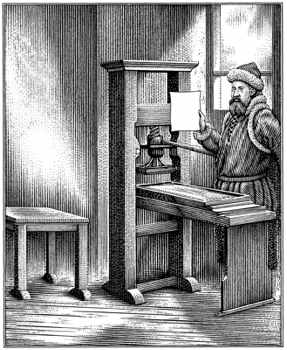
Johannes Gutenberg invented the printing press with replaceable/moveable wooden or metal letters in 1436, and revolutionized the production of books, fostering rapid development in the sciences, arts and religion through the transmission of texts. It played a key role in the Protestant Reformation, via distribution of pamphlets in an effective, yet inexpensive, way. It also helped fuel the Scientific Revolution. With the ushering in of the “Printing Revolution”, the Gutenberg Printing Press laid the material basis for the modern, knowledge-based economy and the spread of learning to the masses.

The “Ninety-Five Theses on the Power and Efficacy of Indulgence”, written by Martin Luther in 1517, is widely credited as the start of the Protestant Reformation. The theses debated and criticized the Church and the Pope, and many of the doctrinal policies regarding purgatory, Mariology, sacraments, indulgences and the authority of the Pope. By the early 1520s, Luther had attracted a vast following, as the newly formed printing presses had helped spread his message, and reputation, across Germany. The Reformation offered two choices-to be Catholic or Protestant, and there was no real alternative. In the lights of the Reformation, the Church, too, started a counter reformation; heretics were subject to punishment, torture and death, and books propagating Protestant themes were burned. Meanwhile, wherever Protestantism had obtained official status — England, Scotland, Geneva, Germany and Scandinavia — Catholics were persecuted. The Reformation split Europe, and shattered the religious unity of Europe. The Church as an institution suffered a severe setback in terms of its moral authority and political power. By strengthening the power of monarchs, the Reformation helped to produce the modern state, and, in an indirect way, Protestantism contributed to the growth of political liberty.
As an interesting sidepoint, Luther’s toilet has been recently discovered by historians, and it was on that very toilet that he wrote the theses, due to spending large amounts of time sitting on it because of constant constipation. You can read more about that here.
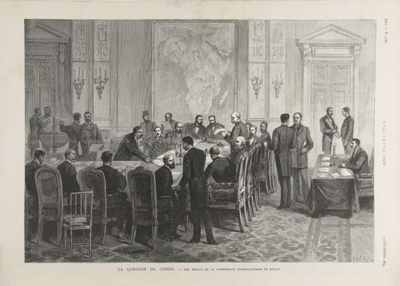
The Berlin Conference (1884 A.D.) had been called for by Portugal, and was organized by Otto von Bismarck, the Chancellor of Germany. Its outcome, known as the General Act of the Berlin Conference, is often seen as the formalization of the Scramble for Africa, where European superpowers carved themselves pieces of Africa on paper in order to extend economic and nationalistic agendas. The conference ushered in a period of heightened colonial activity on the part of the European powers, while simultaneously eliminating most existing forms of African autonomy and self-governance. By 1895, the only independent states in Africa was Liberia and Ethiopia.
![]()
Throughout history, the influence Jesus had on the lives of people has never been surpassed. Christianity has evolved the world, and changed how people think, and live. Even the dating system we use is based on the birth of Jesus. The subject of countless books and debates, no other person has had more affect on world history than any other leader or philosophy or political movement.
Bonus Moments: Germany’s invasion of Poland, Declaration of Independence by US, End of Apartheid, Invention of the Internet, Assassination of Caesar, The Battle of Waterloo, Invention of Calculus!






